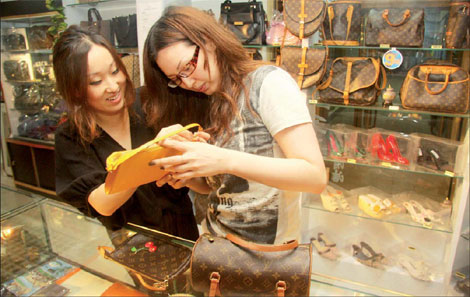Stores offer afterlife for luxury goods
Updated: 2011-09-16 08:53
By Yao Jing (China Daily)
|
|||||||||
|
|
More shoppers are buying into the idea of purchasing previously owned items
Li Aitong, a 46-year-old business owner, paid 260,000 yuan ($40,653) for a light green Hermes Birkin handbag at Milan Station, a Hong Kong-based second-hand luxury handbag chain - that was 100,000 yuan higher than a new one directly from Hermes.
The ostrich leather bag is a gift for her daughter who's turning 24.
Li says her daughter has been wavering on spending so much money on a bag. Li had been searching boutiques all over the country, but to no avail. Which is why she decided to purchase a bag from the second-hand store.
"Otherwise, I would have had to wait three to five years if I ordered it in the brand store," says Li.
Second-hand luxury goods stores are becoming popular in China as suppliers of new products increase prices and demand for high-end items continues to rise.
Customers come and go in a steady stream at Milan Station, located in the China Central Place, a premium commercial complex in Beijing. Most of the customers appear to be in their late 20s or early 30s.
Milan Station has another store in Beijing's Sanlitun Village, a popular shopping destination. Gross sales of the two stores grew to HK$33.1 million ($4.23 million) in the first half of 2011, a 95.5 percent increase compared with the same period last year, according to its online financial report.
It also opened a new store on Nanjing West Road in Shanghai in late August, bringing its total number of stores to 14.
Last month, Vogue 2, one of the first second-hand luxury shops in Beijing that opened in 2004, launched another store nearby at Jianwai SOHO, one of the most fashionable commercial complexes in Beijing.
Sensing the market potential, Rain-Wow Consignment Store opened a flagship shop in Beijing four months ago on Wangfujing Street, which is filled with hundreds of stores. It sells all kinds of second-hand luxury goods, including bags, jewelry, watches, clothes and shoes.
Second-hand goods are ranked according to wear and tear. Rain-Wow will only accept items they deem at least 80 percent of its original quality.
Besides the possibility of acquiring rare limited-edition goods, price differences between new and second-hand items can range from 10 percent to 80 percent, depending on standard value depreciation, origin, style, year of production and so on.
A near-mint quality Gucci leather bag with bamboo handles, hand-stitching and tassels at Rain-Wow is priced at 11,800 yuan, a discount of about 45 percent from the market price of 21,800 yuan. The new Chanel Coco classic flap black sheepskin bag with a gold chain is discounted by 20 percent, from 38,522 to 30,800 yuan.
"We sell more than 200 bags a month and Louis Vuitton accounts for nearly half of the sales," says Luo Zhaodong, a shop manager at Milan Station in Beijing.
Luo says people prefer brands such as Louis Vuitton, Gucci and Chanel, which are known around the world.
"Some of our customers come to buy bags to match their seasonal attire, and they will come back to trade in those bags with the original receipt after several months. Recycling is a good way for them to save money as well as satisfy their different requirements," says Liang Yue, an employee at Milan Station.
Although consumer prices keep soaring in China, people's desire for luxury goods is showing no sign of slowing down.
According to the latest report by the World Luxury Association, China's luxury goods market was worth $10.7 billion in 2010, one-fourth of the world's total.
Meanwhile, companies say their consignment sales services are also being pushed up by customers who want to get rid of brand products they no longer use.
Unlike Milan Station, which pays for used goods, Rain-Wow gives the sellers money when their goods are sold.
A seller surnamed Pan, a 30-year-old businesswoman not willing to give her full name, was selling a pale green jade bracelet she bought in Myanmar several years ago.
"The idea of consignment came to me when my friends in Hong Kong told me about the second-hand stores. I want to sell my jewelry so that I can buy new items and save some money at the same time. Besides, I can sell it at a higher price compared with trading it in a pawnshop," she says.
Pan signed a three-month contract with Rain-Wow and set the price at 230,000 yuan. If the store doesn't sell the item in three months, Pan can either retrieve the item or sign a new contract.
Many of China's middle-class and newly-rich consumers consider used goods cheap. Because of this notion, second-hand luxury stores initially had a hard time selling items.
"People's awareness toward second-hand goods has gradually changed," says Yang Xu, owner of Vogue 2. "We suffered hard times after opening, but we persisted, as we believed vintage would be fashionable in China," Yang says. "Our business is stable now. The majority of our clients are white-collar and well-educated young people."
Vogue 2 only sells products that are at least 70 percent of their original quality. The top-selling items at Vogue 2 are handbags, with a sales volume of about 50 per month. Shoes, on the other hand, aren't as popular. Yang says the store sells about one pair per month.
"Customers are cautious with goods that directly come in contact with their bodies. Also, shoe styles change quickly, closely following trend indicators," Yang says.
He also says shoes are more difficult to sell because of the different needs of the sizes.
For Li, who bought the Hermes bag for her daughter as a birthday present, she didn't think twice about paying 100,000 more than the original asking price at the second-hand store.
As she handed over her credit card, she said she considers the bag a long-term investment as the Hermes Birkin brand will retain its value.
(China Daily 09/16/2011 page16)











